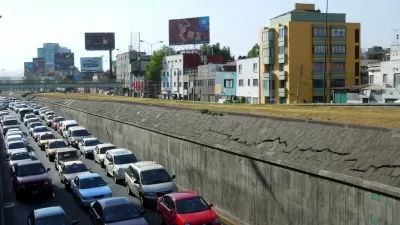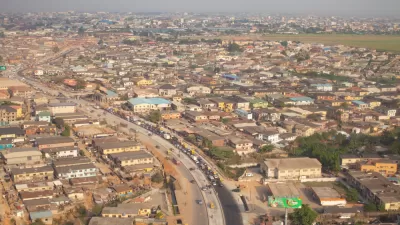Manish Bapna outlines the factors that put China on the frontlines of sustainable urban development.
As Bapna explains, China is no stranger to the woes that plague modern cities. Over half the country's residents are now urban dwellers, facing "poverty, over-crowding, pollution, and congestion" on a scale that dwarfs other cities around the globe. And China has achieved this status in a phenomenally short time: just forty years ago, peasant farmers accounted for a whopping eighty percent of the population.
But China's massive and growing urban population presents a unique opportunity – while most urban growth in the Western world will take place in existing cities (at least for the immediate future), developers in China must build new cities from the ground up just to keep up with demand. It's estimated that by 2030, China will boast 221 cities with over 1 million residents. By comparison, Europe has only 35 such cities today. Thus, "While the idea of smart cities is not new, creating sustainable cities for the booming global population requires scaling up on a whole new level. And there is no better place to start than in China."
The government of China has not failed to recognize this opportunity, and has incorporated several environmental goals for its 12th Five-Year Plan. To accomplish those goals, it will work with the World Resources Institute to develop policies and projects for energy efficiency, sustainable transportation, and clean water.
FULL STORY: China's Population Challenge: Designing Sustainable Cities For The Future

Planetizen Federal Action Tracker
A weekly monitor of how Trump’s orders and actions are impacting planners and planning in America.

Restaurant Patios Were a Pandemic Win — Why Were They so Hard to Keep?
Social distancing requirements and changes in travel patterns prompted cities to pilot new uses for street and sidewalk space. Then it got complicated.

Map: Where Senate Republicans Want to Sell Your Public Lands
For public land advocates, the Senate Republicans’ proposal to sell millions of acres of public land in the West is “the biggest fight of their careers.”

Maui's Vacation Rental Debate Turns Ugly
Verbal attacks, misinformation campaigns and fistfights plague a high-stakes debate to convert thousands of vacation rentals into long-term housing.

San Francisco Suspends Traffic Calming Amidst Record Deaths
Citing “a challenging fiscal landscape,” the city will cease the program on the heels of 42 traffic deaths, including 24 pedestrians.

California Homeless Arrests, Citations Spike After Ruling
An investigation reveals that anti-homeless actions increased up to 500% after Grants Pass v. Johnson — even in cities claiming no policy change.
Urban Design for Planners 1: Software Tools
This six-course series explores essential urban design concepts using open source software and equips planners with the tools they need to participate fully in the urban design process.
Planning for Universal Design
Learn the tools for implementing Universal Design in planning regulations.
Heyer Gruel & Associates PA
JM Goldson LLC
Custer County Colorado
City of Camden Redevelopment Agency
City of Astoria
Transportation Research & Education Center (TREC) at Portland State University
Camden Redevelopment Agency
City of Claremont
Municipality of Princeton (NJ)





























